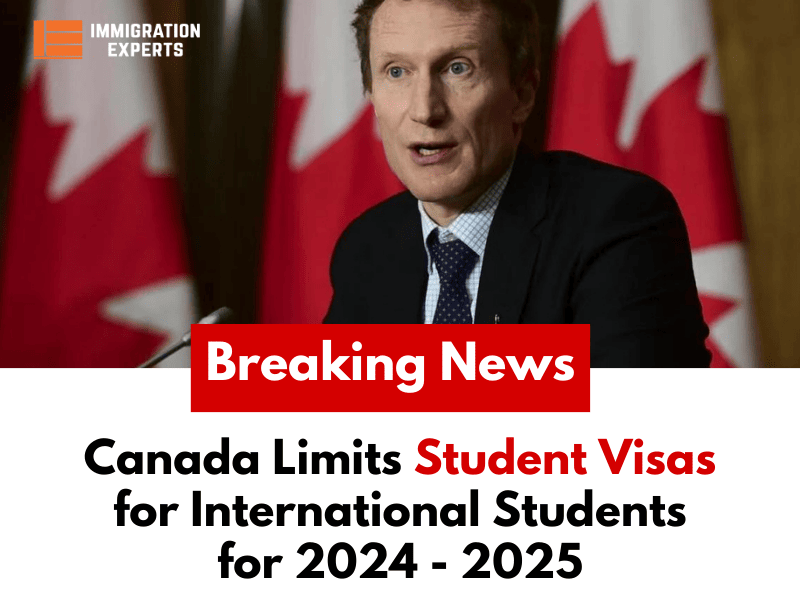051 8439995, 042 35911332

Immigration, Refugees, and Citizenship Canada (IRCC) recently shared news about setting a temporary limit on the number of international students receiving study visas.
According to the IRCC announcement for 2024, they anticipate approving around 360,000 study permits, marking a 35% reduction compared to 2023.
Moreover, IRCC is introducing limits for each province and territory, taking into account their populations. This is aimed at reducing the number of international students in regions where growth has been unsustainable.
It’s essential to note that these limits won’t affect current study permit holders or those renewing their study permits. Additionally, individuals pursuing master’s and doctoral degrees are not included in these restrictions.
Starting from January 22, 2024, every study permit application sent to IRCC must include an attestation letter from a province or territory (PT). PTs are expected to establish a process for issuing these letters by March 31, 2024.
IRCC plans to review and reassess the imposed limits in 2025.
Modifications to the Post-Graduation Work Permit Eligibility Criteria
Changes are on the horizon for the eligibility criteria of the Post Graduation Work Permit (PGWP), as announced by Immigration, Refugees, and Citizenship Canada (IRCC).
Starting in September 2024, international students embarking on a study program connected to a curriculum licensing arrangement will no longer qualify for the PGWP. In these arrangements, students physically attend a private college licensed to teach the curriculum of a linked public college. Despite their popularity among international students, these programs have had less oversight than public colleges, creating a loophole in PGWP eligibility.
Furthermore, IRCC has shared that graduates from master’s programs or other short graduate-level programs will now be able to apply for a 3-year work permit. This is a departure from the current criteria, where the length of the PGWP is tied to the duration of the individual’s study program. This change is particularly significant for master’s students, providing them with a longer window to gain Canadian work experience and potentially transition to permanent residency.
In the coming weeks, IRCC plans to provide more information on open work permits for the spouses of international students. Notably, open work permits will only be accessible to spouses of international students enrolled in master’s and doctoral programs. Unfortunately, spouses of international students in other study levels, including undergraduate and college programs, will no longer meet the eligibility criteria.
Challenges to the Integrity of the System
The recent measure to limit visas for international students in Canada was not a surprise, as Immigration Minister Marc Miller had been discussing the possibility since the summer of 2023 and reiterated it in a December release.

In preparation for the September 2024 semester, the government is taking necessary steps, including visa restrictions, to ensure that designated learning institutions offer sufficient support to students as part of their academic experience. Minister Marc Miller emphasized the need for these measures in light of concerns about the growing number of international students and the impact on the integrity of the education system.
In an interview with CTV news last week, Minister Miller stated that he would be announcing measures related to temporary residents, especially international students, in the first quarter of this year. The decision to implement such measures comes in response to the mounting pressure on Immigration, Refugees, and Citizenship Canada (IRCC) to address the challenges posed by the increasing influx of international students.
Minister Miller pointed out in the CTV interview that some institutions were enrolling students from outside the country who paid a premium for their education but did not necessarily receive the promised quality of education. The latest IRCC release emphasizes that certain institutions have significantly increased their student intakes to boost revenue, resulting in more students arriving without the necessary support for success.
The release also highlights that the rapid surge in the number of international students arriving in Canada puts strain on various resources, including housing, health care, and other services. The government aims to address these challenges to maintain the integrity of the education system and ensure that international students receive the support they need for a successful academic experience in Canada.
Students From Abroad Studying in Canada
In 2022, Canada welcomed more than 800,000 international students, and the minister anticipated this number to exceed 900,000 in 2023. Concerned about the escalating situation, the minister expressed that the system was “out of control” and outlined efforts by the Immigration, Refugees, and Citizenship Canada (IRCC) to bring federal affairs in order.
The minister raised apprehensions about a “permissive” designated learning institution (DLI) structure in the provinces, emphasizing the need for robust discussions between provincial governments and their DLIs. DLIs are the exclusive post-secondary institutions in Canada authorized to admit international students, numbering over 1,000, with 529 located in Ontario.
In December, IRCC introduced additional changes to the international student program, notably doubling the cost-of-living requirement for international students from $10,000 to $20,635. The rationale behind this adjustment was to better prepare international students for the actual cost of living in Canada.
Looking ahead, IRCC plans to implement a Trusted Framework Agreement with DLIs, scheduled for the 2024 academic season. This agreement aims to streamline the processing of study permits for eligible DLIs, providing expedited services to enhance the overall experience for international students in Canada.
